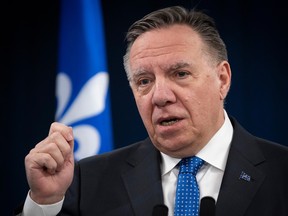In their annual debate over government spending Wednesday, party leaders traded barbs and jabs for three hours.

Article content
QUEBEC — Premier François Legault has confirmed he intends to seek a third term in office in the 2026 general election despite his government’s sagging fortunes in public opinion.
And he dodged two traps put before him, one by Parti Québécois leader Paul St-Pierre Plamondon who badgered him to say what he would do in the event his political option is a dead end, and a second by interim Liberal leader Marc Tanguay who tried to get him to trip up on the price of an apartment in Montreal.
Advertisement 2
Article content
Article content
In a wide-ranging debate with the three opposition leaders at the legislature, which stretched over three hours, Legault found himself defending his record on everything from the $11-billion deficit in the spring budget to housing to talks with Ottawa to reduce the number of temporary immigrants coming to Quebec.
It opened with questions from Tanguay, who asked Legault rapid-fire questions including whether he will seek re-election in 2026, a third mandate as premier. Legault repeated what he said a year ago on this issue.
“Is there enough work left to do for a third mandate? Yes,” Legault answered. “And, yes, I will be a candidate.”
Legault is 66.
Asked if he feels he deserves a third mandate, Legault also was clear.
“Yes, without being arrogant,” he said, dismissing Tanguay’s request to grade his performance from one to 10.
But in the midst of Quebec’s housing crunch, Tanguay tried a tactic used in 2021 by Québec solidaire co-spokesperson Manon Massé, asking Legault if he knows the exact rental price of a four-and-half room apartment in Montreal.
In 2021 Legault tripped up on the answer floating it might be $500 or $600 a month when in fact it was over $1,300. QS rapidly used the incident to roast Legault and make him seem disconnected from the problems of regular people.
Article content
Advertisement 3
Article content
This time, Legault hesitated to answer, telling Tanguay his team of bureaucrats — sitting behind him for the debate — would check. But even when secretary-general of the government, Dominique Savoie, came up with a number, which she showed Legault, he refused to reveal it because he said he wants to be sure it is correct first.
He accused Tanguay of trying to steal an old QS tactic.
“You want to make yourself into a Manon Massé,” Legault shot across the floor of the Blue Room where the debate took place.
Later, answering questions from QS co-spokesperson Gabriel Nadeau-Dubois who said the government is dragging its feet on building more housing, Legault ran down a long list of investments made by his government.
He argued the free market system is also part of the solution, noting that his government’s tax cuts over the last few years have given Quebecers more money to buy a first home.
“We think the best way to proceed is to put money in the wallets of Quebecers,” he said.
He repeated to Nadeau-Dubois his view that one reason for the shortage is the rising number of temporary immigrants including 178,000 asylum seekers. The total is now 560,000, way more than Quebec can manage on its own, he said.
Advertisement 4
Article content
“That’s not an increase, it’s an explosion,” Legault said.
Legault and Tanguay then tangled over the long-term impact of Quebec’s March budget, disputing whether the deficit spells future spending cuts. Tanguay challenged Legault to confirm future increases in spending in health will be limited to four per cent and three per cent in education.
Later, St-Pierre Plamondon, who as the third opposition leader was only entitled to 12 minutes to make his points, grew frustrated when he challenged Legault to to say whether he “would be ready to consider” joining the Yes side in an independence referendum if his Coalition Avenir Québec government hits a dead end.
“I know you are relatively new to politics,” Legault told St-Pierre Plamondon. “But this is highly hypothetical question and he should know in politics we don’t answer hypothetical questions.
“What I can say is we don’t want a referendum, Quebecers don’t want one.”
Legault then tossed past statements made by St-Pierre Plamondon in which he said he did not see the need for independence back in his face.
He said in reality St-Pierre Plamondon does not want the federal system to work.
“I have not given up the fight,” he said.
And as he lost his chief whip, Éric Lefebvre, to the federal Conservative Party, Legault said he has not excluded wading into the next federal election campaign to express a preference for one party or another as he has in the past with mitigated success.
Recommended from Editorial
Advertisement 5
Article content
Article content





